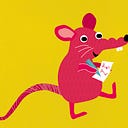How to Be Happy #33: “The Hurrieder I Go…
…the behinder I get,” said the White Rabbit from Alice’s Adventures in Wonderland. When he first appears in the book, he runs around exclaiming, “I’m late! I’m late! For a very important date!” But that issue–punctuality–will have to wait for another blog.
This writing will focus on productivity, the chimera the WR is chasing after and, he frets, lagging farther and farther. Why are humans obsessed with productivity? And who can we blame for this? Henry Ford, the inventor of the assembly line? Who decided our activities of daily life, e.g., the number of books we read, hours we sleep, steps we take, etc., should become “key performance indicators or KPIs”?
Okay, let me back up a bit here. What exactly is productivity? Technically, it’s “the physical output per unit of productive output.” So, for instance, if you’re a basketweaver, the number of baskets you weave in an hour (day, week, month, year, lifetime) indicates your basketweaving productivity, your basketweaving KPI as it were. In the business world, it seems obvious why productivity is important. The greater number of cars your autoworkers, who work a set number of hours for a set rate, can make for you every day reduces your “unit cost” to make the cars and increases your profits from selling them.
The problem, as I see it, is that the idea that we must be “productive” spills over into our personal lives. I must do ten tasks from the job jar today. I must drink eight glasses of water. I must exercise for 30 minutes or longer. And the belief that we must do these things and more can create self-inflicted pressure and stress and have negative psychological effects when we fail.
One of the rabbit holes we have fallen down in this respect was created by personal technology. Author Lynn Enright explains:
Each time I log on to social media, it seems someone is sharing a measurement of their leisure time; how many kilograms they lifted if they’re into fitness; how many words they’ve written if they’re an aspiring novelist; how many alcoholic drinks they haven’t drunk if they’ve recently given up.
She continues with this damning assessment:
After a long day or week in the office, meeting deadlines and achieving our KPIs, we go home and fulfill another set of demands. This time, they’re not set by an employer; they’re set by us. Well, us — and the algorithms and software systems that increasingly shape our existence.
Enright recalls being disappointed when she walked for what she thought must be several miles but didn’t have her phone with her to confirm the distance: “Had the steps really happened if they hadn’t been counted?”
She then sums up the trouble with being chronically produsessed [you get it]:
The problem occurs when the pressure to be productive in our leisure time — and to then perform that productivity by sharing it online — alongside maintaining a career and family life leads to a sense of panic, of relentlessness, of burnout. “Feeling guilty about resting, taking time out, because you should be producing something, always producing — if only a state of anxiety in yourself, because of your lack of apparent productivity — is one of the great problems of modern working life, and especially so for knowledge workers,” says O’Mara [a professor of experimental brain research].
And finally, she offers some advice that may seem, well, counterproductive:
To maintain a productive life, it is necessary to be unproductive at times. Stare out the window for an unknown amount of minutes. Take a slow, meandering stroll while your phone is switched off. Fall asleep on a plane, as the sun warms your face, just until you feel a crick in your neck. Find uncountable moments and enjoy them, alone and offline.
I might, and will, paraphrase the White Rabbit here to capture the gist of today’s lesson: “The hurrieder I go, the crazier I get.” I realize you may need help getting started down the road to unproductivity. I certainly do. I recommend Jenny O’Dell’s book How to Do Nothing: Resisting the Attention Economy. She begins by stating, “Nothing is harder to do than nothing” and then goes on to make a persuasive case for doing just that. Words to live by, with emphasis on the word live.
